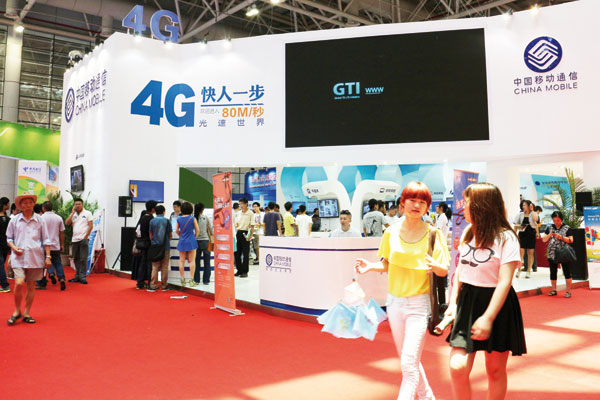China's telecom firms reveal 4G strategies
|
 |
Industry experts expect government to issue licenses in the near future
China's three telecom operators have laid out their strategies on the development of fourth-generation, or 4G, mobile networks, as the official issuance of 4G licenses is expected to happen soon.
China Mobile Ltd - the world's biggest telecom operator by subscribers - has always been an aggressive promoter of the domestic Time Division-Long Term Evolution, or TD-LTE, 4G technology.
Xi Guohua, its chairman, briefed the press on the company's latest progress on TD-LTE network deployment at Shanghai's Mobile Asia Expo on Wednesday.
Xi said that China Mobile has built more than 22,000 4G base stations in 15 Chinese cities, but that it plans to set up 200,000 base stations in 100 cities by the year-end.
However, the other two smaller Chinese telecom operators - China Unicom (Hong Kong) Ltd and China Telecom Corp Ltd - have expressed their willingness to adopt the Frequency Division Duplex-Long Term Evolution, or FDD-LTE, technology, or at least to build a converged network under both standards.
TD-LTE and FDD-LTE are the two major 4G international standards, but the latter has gained more popularity across the globe and has stronger industry support.
Lu Yimin, general manager of China Unicom, said the company is conducting tests for 4G wireless networks with mixed technologies. It is the first time that China Unicom has admitted that it is actively preparing to launch 4G services.
However, Lu added that because the Chinese government has not yet awarded the 4G licenses, China Unicom's final strategy is still "uncertain." Lu also made the remarks at Shanghai's Mobile Asia Expo.
Last weekend, Wang Xiaochu, China Telecom's chairman, confirmed that the company is stepping up efforts for its LTE network trials.
"It's inevitable (for China Telecom) to adopt a converged network, since the spectrum is at the core of every carrier's resources," Wang said.
Even though Chinese authorities have not said exactly when they plan to issue the 4G licenses, industry experts expect the licenses to be awarded shortly.
He Shiyou, executive vice-president of ZTE, expressed an optimistic view on TD-LTE's prospects in China.
"I think that all the three Chinese telecom carriers will get TD-LTE 4G licenses because the rich TD-LTE spectrum resources in China allow the government to do so," he said.
Shang Bing, vice-minister of the Ministry of Industry and Information Technology, said the development of the TD-LTE technology has entered a fast-track phase.
"The Chinese government will firmly support TD-LTE industry development, and help create a favorable policy and market
The moves by the three Chinese carriers will help to further back the development of 4G technology globally, said Anne Bouverot, director-general of the GSM Association, an industry alliance of mobile operators and related companies. "In general, what matters is not to have the absolutely best technology, but that everybody agrees to deploy it. That's where you get the economy of scale, and get the equipment for networks and handsets to improve each time there is a new release," she said. Analysts have said that LTE 4G technology will usher in a society much more connected and convenient for people. Jin Lee, senior managing director at Accenture's mobility department in South Korea, said that LTE will provide speeds about 50 percent higher than current Wi-Fi networks. "Once consumers get to taste that speed, they will never go back," Lee said.

























